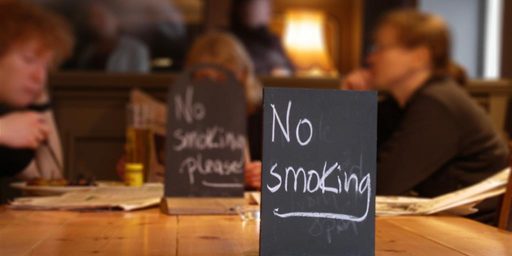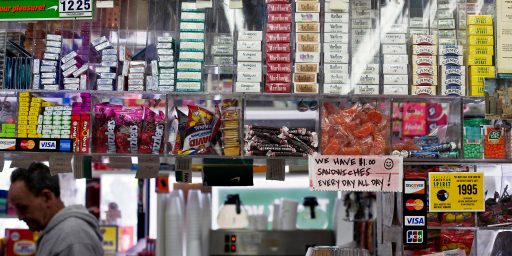New York’s Bar Smoking Ban
In Barrooms, Smoking Ban Is Less Reviled (NYT)
Back in 2002, when the City Council was weighing Mayor Michael R. Bloomberg’s proposal to eliminate smoking from all indoor public places, few opponents were more fiercely outspoken than James McBratney, president of the Staten Island Restaurant and Tavern Association. He frequently ripped Mr. Bloomberg as a billionaire dictator with a prohibitionist streak that would undo small businesses like his bar and his restaurant. Visions of customers streaming to the legally smoke-filled pubs of New Jersey kept him awake at night. Asked last week what he thought of the now two-year-old ban, Mr. McBratney sounded changed. “I have to admit,” he said sheepishly, “I’ve seen no falloff in business in either establishment.” He went on to describe what he once considered unimaginable: Customers actually seem to like it, and so does he.
By many predictions, the smoking ban, which went into effect on March 30, 2003, was to be the beginning of the end of the city’s reputation as the capital of grit. Its famed nightlife would wither, critics warned, bar and restaurant businesses would sink, tourists would go elsewhere, and the mayor who wrought it all would pay a hefty price in the polls. And then there were those who said that city smokers, a rebellious class if ever there was one, simply would not abide. But a review of city statistics, as well as interviews last week with dozens of bar patrons, workers and owners, found that the ban has not had the crushing effect on New York’s economic, cultural and political landscapes predicted by many of its opponents.
Employment in restaurants and bars, one indicator of the city’s service economy, has risen slightly since the ban went into effect, as has the number of restaurant permits requested and held, according to city records, although those increases could be attributed in part to several factors, including a general improvement in the city’s economy.
My chief argument against such bans was always libertarian rather than economic. Few Manhattanites were likely to travel to New Jersey to go clubbing. Not only is would it be inconvenient, but it would be uncool. Still, there may be more of an economic argument in places where mobility is easier and less socially constrained. For example, a report on NPR recently noted that bar owners in DC’s Maryland suburbs were concerned that a smoking ban was going to cost them money because patrons could easily go to northwest DC to drink in smoke-permissable establishments.
I must admit, though, that the libertarian in me has to fight hard to dominate on this issue. I absolutely despise smoke-filled establishments and get quite ill if subjected to them for any length of time.
Kevin Drum notes that his very first blog post was on this subject and he got it right.






One thing I’ve never understood is why no one has explored some licensing system. Require a license for bars or restaurants to allow smoking, and that way some will allow smoking, others won’t. If too many allow smoking, increase the cost of the license; too few, decrease the cost. That way, everyone wins: the city gets a new source of revenue, smokers can find smoking places, and non-smokers can go to smoke-free places.
Well I am a non smoker, but I am not a fan of the various smoking ban laws, mostly because I think it is a little too much of government playing the nanny.
I think it should be up to the private owner to decide whether or not they want to be smoke free.
I am, like James, a libertarian on this issue–which is precisely why a ban like this is perfectly acceptable. The rationale for such bans is to protect a semi-public environment for everyone. Bush’s EPA lists secondhand smoke as a Group A carcinogen.
How is it, by any stretch of the imagination, “liberatrian” to allow someone to knowingly endanger the health of someone else? Allowing smoking in semi-public spaces infringes on the health of non-smokers, a clear violation of non-smokers’ liberties.
“semi-public”? It’s not like these bars are being subsidized by the government, sheesh…
Far as I’m concerned, the only person that should be making the rules as to what a private business allows on their property is the person who’s signature shows up on the checks. I don’t smoke, don’t like the smoke either, but I can vote with my dollars & go somewhere else, why should I deny smokers that same ability?
B-psycho-
The term “semi-public” basically refers to a place not controlled by the state, but, nonetheless, accomodates the general public.
Private workplaces, businesses, etc… fall under this category. There is no reason to imply that such an establishment needs to be “subsidized by the government” to be considered public.
The main problem with the “market model” regarding smoking is that second-hand smoke is a public health hazard. While consumers may have the ability to withold their patronage, workers have much less choice.
Municipal, state, and federal governments have a legitmate role to insure workplace safety. Limiting smoking in the workplace helps individuals prosper to live free and without undue exposure to environmental hazards in civil society.